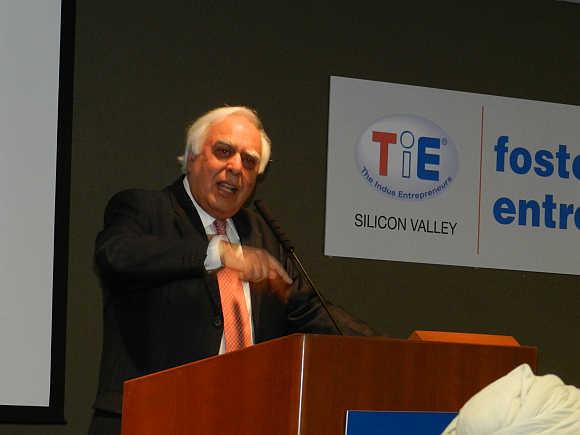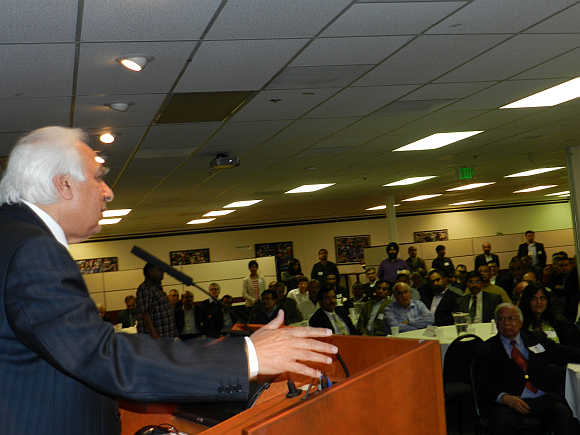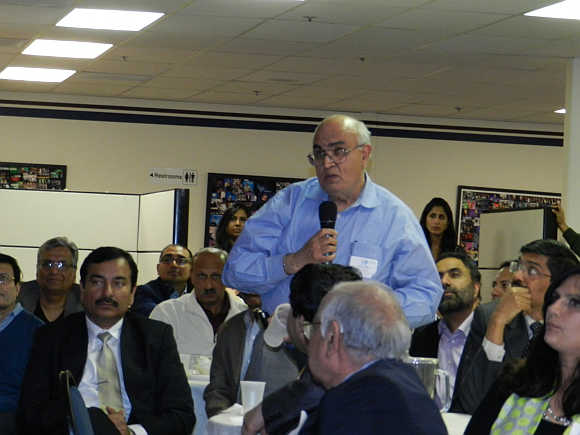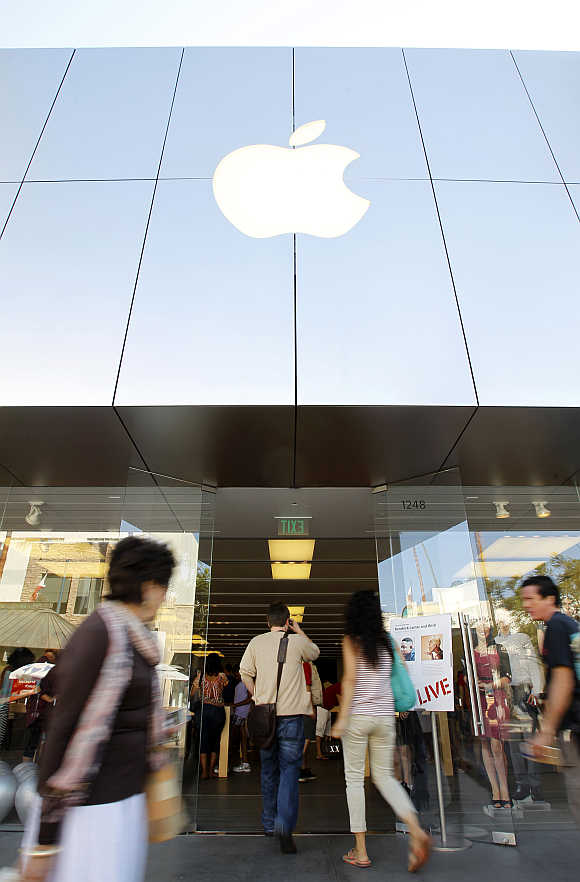
"We want manufacturing to take place in India because we cannot afford to pay $400 billion in electronics we do not have that money," Sibal, said on spending in India's electronics market that is expected to reach about $400 billion by 2020.
Sibal in the past few days has visited several companies, had a road show and a series of meetings, with his offer urging them to open manufacturing units in India. The private meeting though was not disclosed but he visited Cisco, Apple, SanDisk Corporation, Applied Material, Oracle to name a few.
During his speech on Wednesday at TiE Silicon Valley, Sibal said that everyone he met in the Silicon Valley was enthusiastic about manufacturing. This was not the case five years ago. "We've realised the market is huge," said Sibal and added, "There is a great combination we have a very high quality human source."
To attract the companies Sibal said the government has come up with a policy National Policy on Electronics set up past June, that offers series of incentives and subsidies to encourage firms to set up electronics manufacturing units under the programme Electronic System Design and Manufacturing.
He said the manufacturing need is everywhere whether it's medical, energy, avionics or automobile, there is a huge revolution taking place. "Industries are extremely happy to come to India," he reiterated.
"We want to come into hardware and see them (young generation) succeed and create job. So we have put some incentives in place for the industries to come. Both in terms of electronic manufacturing cluster, subsidy to set up fab (electronic chip fabrication) industry," acknowledged Sibal. Government will be offering 50 to 75 per cent of incentives in electronic manufacturing cluster.
He added: "Along with this, we believe by 2020 we'll have a total employment capacity in electronics alone would be 28 million young people. That's the kind of potential we are looking at. The investment requirement would be over $100 billion and we believe that by 2020 we believe that 65 per cent of all electronic products must be manufactured in India."
...

Talking about telecom industry he said what is happening at present is telecom companies in India are just importing stuff, assembling it and making a profit.
"There is no manufacturing taking place and that is not good for us. What are they giving to India?" asked Sibal. Now with the policy if some products are going to be sold to government it has to be manufactured in India. "Some products with impacts on security must also be produced in India," stated Sibal.
Sibal also talked about setting up India's own 'International Standard' and regulations in terms of electronic manufacturing that would be active from April 2013."Why should we have standard being set by this part of the world (US). The market is there. I say they should follow us. We need to think differently," said Sibal.
"This is why we are here and there is no better place to communicate and share with those who have changed the world and are destined to change the world," said the minister to the 200 plus TiE members.
Ajay Kumar, joint secretary, Government of India, Ministry of Communications &IT, Department of Electronics and IT, told Rediff.com that India has grown in the software sector but electronic sector hasn't done well in the last couple of years. India is importing all electronic demand as of now and situation has reached to such proportion that it is not sustainable to continue doing it. Projection is that by 2020 the requirement of electronic is going to be $400 million out of which the import bill for electronic would be nearly $300 billion.
"Also the government thinks more over creating necessary jobs to young people in India," said Kumar. This will create more jobs and less dependence on import.
This policy aiming to create India as the new destination which is globally competitive. To produce electronics both for the growing Indian demand a well as for export for India. The products that are going to be developed for India are going to be relevant to the huge part of the developing world also. So there are huge opportunities for export. The new policy is holistic. It talks of infrastructure, incentives and innovation. It leverages the human resource that India has. The talent in India is its biggest asset.
...

"We have met several top companies in different sectors and the response has been amazing. The dependence on electronics on China is about 40 to 45 and that is not sustainable to the world. They want to diversify into different geographical areas. That is why we see immense interest opportunity for collaboration between US companies and Indian companies," said Kumar.
He said: "We did visit Apple and they are very serious about what they could like to do with India," said Kumar, though denied further information. Other companies they visited were Cisco, Sandisk and Applied Material.
"The minister did not visit Google or Facebook, this visit was totally focused on manufacturing, electronic and design manufacturing and attracting investment for that purpose," said Kumar. He said most of the question that came from the US-based companies during their meetings were on infrastructure, streamlining of procedure and these are genuine problem that India has.
He said Government of India is investing $1trillion in the next five years on infrastructure. On streamlining procedure he said, "We have laws that sometimes make it extremely difficult to follow."
Answering on states in India that are ready to welcome these foreign companies Kumar said: "All these excitement is happening in the last six months because state government are competing with each other and now we have a new states in western and even central India are getting active. That is a good sign for us."
India is a $400 billion market in electronics and in scale India is the only country apart from China which can match the scale required for the huge demand for electronics, one of the fastest growing sector of the world. The new policy is conducive, said Kumar.
Commenting after the speech of Sibal Vish Mishra, immediate past president TiE, told Rediff.com: "They really want to go into manufacturing in a big way and they have established policy, incentives and subsidy. They seem to be working to eliminate some red tape. Hopefully that will work."
...

They are looking for component manufacturing to sub-assembling and electronics medical electronics to computers. What is very encouraging is they are talking about 250,000 villages with broadband.
"Without deeper broadband penetration I think progress cannot occur in India," said Mishra. "With a country with 1.2 billion large it will not do we need at least 100,000 million broadband connection. They need that if they have to improve.
"I am glad they are thinking in an ambitious way. Even if they achieve one fourth of the goal, I will say India is on the right path," said Mishra. They now want to focus from software to hardware but the software employees only two million people in India and they are saying they are going to employ 28 million people. I am not too sure how they have made that statement," shared Mishra.
He added: "I don't think they should abandon software in a hurry because software hasn't arrived yet in India as compared to US or UK."
If you look back in retrospect India probably could have progressed much faster then they have because of infrastructure, it's still a big issue. Today infrastructure is holding the GDP growth back by two to three percent. The other problem is every state has its own policy. Even the tariff between the states is an issue. They have to work with jurisdiction issues with the states and the labour law.